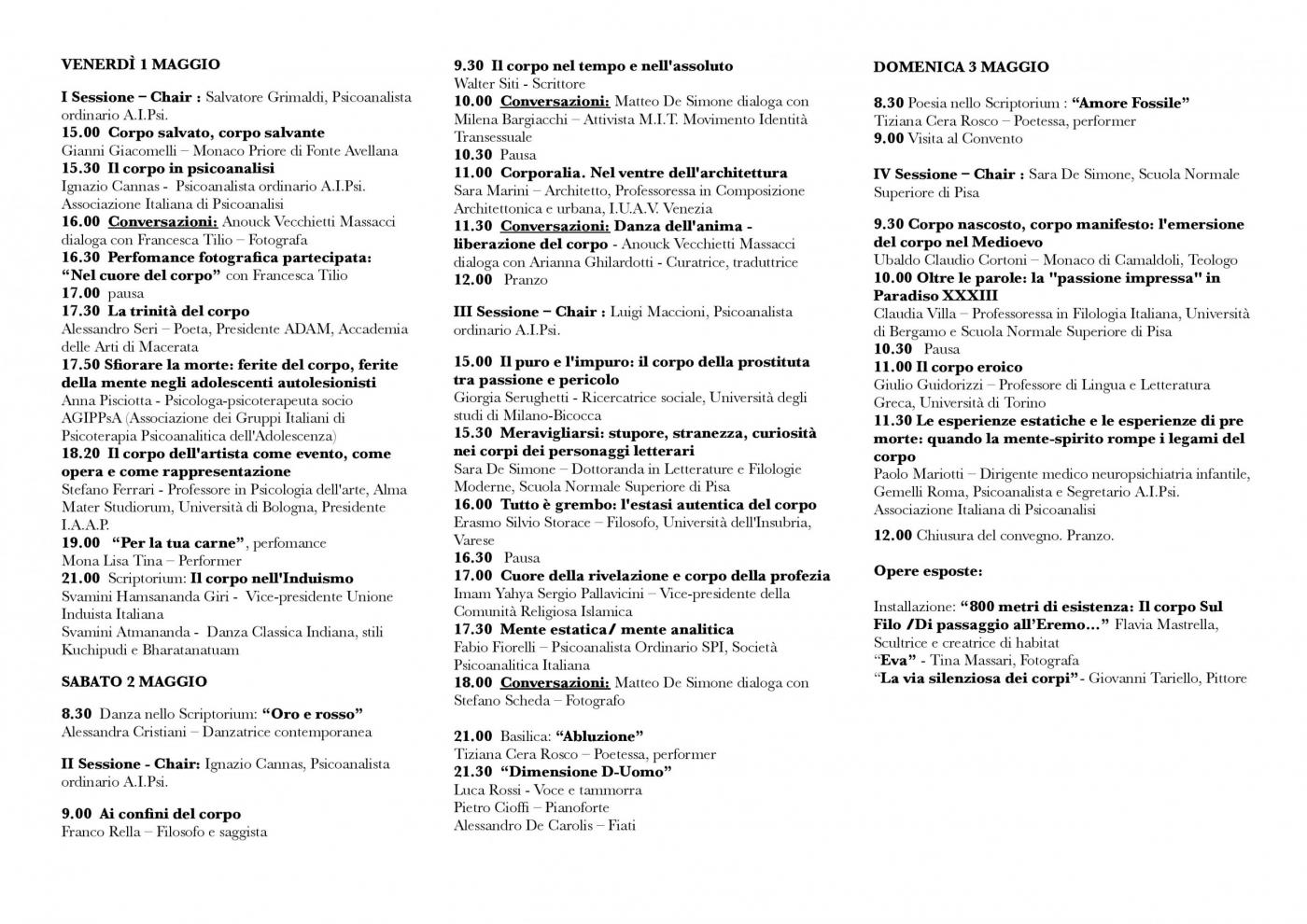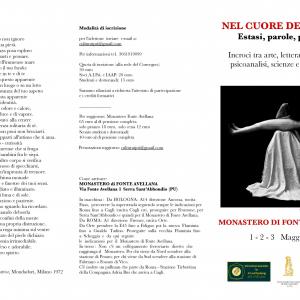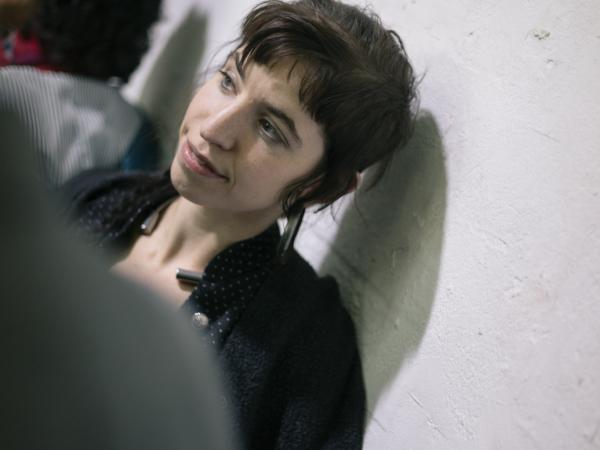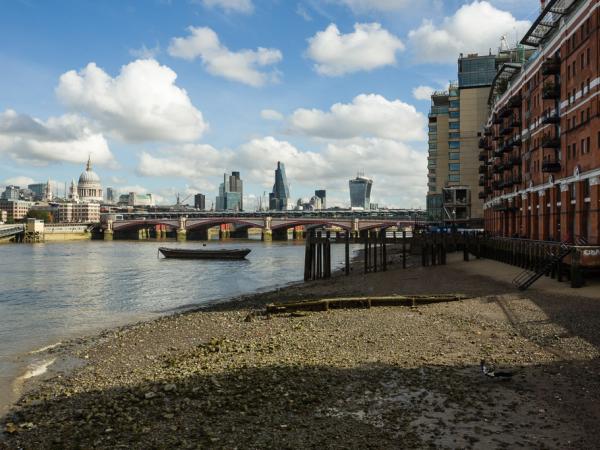The Italian Association of Psychoanalysis (AIPsi), the International Association for Art and Psychology (IAAP) and the monastery of Fonte Avellana, present the interdisciplinary conference: "In the heart of the body: ecstasy, passions, the words" to be held from 1 to 3 May 2015 at the monastery of Fonte Avellana.
The days of Fonte Avellana propose to compare students from different backgrounds, in search of reciprocity and respecting the differences between the various disciplines, in the belief that only the intersection of ideas can be fruitful, even more so in an era confused and aesthetically superficializzante like ours.
The days provide reports masterful given by eminent national and international scholars, a section called "conversations" in which scholars from various disciplines will be called to discuss the proposed theme.
THE PLACE
The Monastery of Fonte Avellana is situated at the forested slopes of Mount Catria (1701 m.) To 700 meters above sea level.
Its origins lie in the late tenth century, around 980, when some hermits chose to build the first cells of a hermitage that over the centuries became the present monastery.
The spirituality of these hermits was influenced by Saint Romuald of Ravenna, the father of the Camaldolese Benedictine Congregation. He lived and worked between the X and XI century in areas very near to Fonte Avellana, which Sitria, Mount Petrano, and San Vincenzo al Furlo.
Significant boost gave the work to the abbey of St. Peter Damian, who became monaco here in 1035 and Prior since 1043, not only for the expansion of the original buildings but also for a strong cultural and spiritual development that he made a point of the hermitage religious and social reference. Tradition gives the number of 76 saints and blessed lived in the hermitage.
The Hermitage is mentioned in the Divine Comedy (Paradiso, Canto XXI) by Dante Alighieri, which seems that it was also a guest.
Fonte Avellana was, as always, a hub of culture and promoter of initiatives and exchanges with scholars from different cultural and religious
THE CONFERENCE
The body
"The ego - writes Freud in 'ego and the id - is primarily a corporeal being, not just superficial entity, but is itself the projection of a surface."
Plato is the first advocate of a dualistic position: soul and body are two distinct substances and independent.
The soul is immortal and lives after the death of the body, but has existed even before the body to which he was chained.
Aristotle on the contrary think that the soul can not be separated from the body.
The soul is identified with specific capabilities of the body, those that allow the same organism to live
Nietzsche in Thus Spoke Zarathustra unifies the body and mind:
"Body and soul-I am so speaks the child. And why should not talk like children? But the awakened and wise body says I am in every way, and nothing else; and soul is nothing but a word to indicate something of the body
Jean Luc Nancy says that we do not have a body but "we are, as we exist": the body is the place of existence, where the character is in the presence temporally limited being. To say that we are a body moves the argument on an ontological level, because if the body is not the attribute of a substance (the soul, the psyche or whatever) you have overcome the Aristotelian distinction between substrate and quality as mode becomes an integral part of being.
The body is the place-logos, the oikos, which begins in the life of the man. Even before the body in the life of every individual starts in the mental representation that his parents did not do.
In the body of this representation is made concrete. Never before at this time of life the body speaks of one who lives, as well as ever at this time of life, two bodies are in such close relationship.
From the beginning the mother's body, in a multi-way communication, tells his "internal guest" of himself and the world and at the same time tell the outside world what is happening and of his body. Consider how the transformer-bodily actions that occur during pregnancy are accepted by those who live around the new mother.
Never before, in the consumer society the body is subject to attempts to change in search of perfection much to hesitate indistinct, fragmenting and even nell'amputazione. It seems that the body is no longer the man, but that man has a body, it is perceived as a dress that depending on the circumstances, the mood of the time should be changed, replaced, modified. The body is worked, equipped, celebrated in tribute to a freedom from all moral boundary that in recent decades served as a hindrance to its possible use. At the same time this alleged freedom becomes a form of control by the power, since the re-creation of a body through cosmetic surgery, the consecration of a single body and perfect that it becomes aesthetic canon vertically imposed and endlessly reproducible all This produces a denial of their own history, their own identity, so everything can be denied and affirmed in a kind of gambling without any awards if not the illusion of un'intangibilità of themselves and of their desire. Even the dramatic uncertainty of gender, labor, human archaic, is bypassed through premature intervention and overlapping identities empty, bodies that are private by the conflict to become images fantasmizzate identity never reached, thus interrupting the journey that clear or stormy is, thus avoiding any possible landing place, the search for identity is arena as an abandoned boat at anchor. A general push towards social undifferentiated towards gender only, where relief is apparent anguish integration and develops a fantasy of omnipotence narcissistic, thus denying any affiliation but also not to belong ever, as an identity suspended , humanity nameless and gender difference.
The ideal body offered by the media is only a representation of a body devoid of fetish content, where the skin no longer performs the necessary function of the boundary between the inside and the outside, but becomes permeable to any insult or caress it , urticata or possessed by every contact form provided or random. In our culture exhibitionist, excessive and vulgar nudity is fashionable, it is no longer a taboo, but it is a representation in which corporeality is trivialized, repeated endlessly, proposing an eroticism sterile plastic and impulses, without any involvement. The nude decontextualized becomes the ready-made plan, the world, the flesh being without mystery becomes the "waste" of the digital material. The naked body becomes a container of beauty "vacuum", the meat loses its sacredness to be / become an object, devitalized, depleted of sense, as exposed in the slaughterhouse. So disappears along with the desire the ability to listen to the body and its demands even when ill. The anguish of death, the loss of its corpus, has turned into anguish to live the body, the possibility that before the death to live, then the body becomes prosthesis, attribute ephemeral desire often unbearable heaviness. So you alter the basic structure itself of its original aggregate of existence, the perception of the body that it is pain, need or desire becomes incomprehensible in its depth and then everything is just acted, as on a stage but not in the role of leading man or actress, but in the space of shadow that passes a set.
The body desiring evaporates as the desire of the body.
It seems, recalling Foucault, that now there is a real control of the bodies which, in fact, determines the uses and addresses, according to the various stages of life and death: the assisted procreation to living wills. The government bodies extends, in fact, now in many fields of social and tends to redesign along with the bodies also a new imagery of morality. I like to mention at this point the insistence of Artaud the materiality of the body, in the pages of the notebooks, in revolt against a power that has deprived man of his own body.
Finalmente- it will be, man, - it will be, - man, -up to the body, until, finally, -the body-come forward, - to the point-in which the body-steps forward, -in which promises to be a body, -of beyond the concrete body-called real-intelligence-or science.
The body procures anguish because it evokes dependence and instability, but at the same time shows a surplus. This inexhaustible surplus is given by the opening of the body itself as this his flesh never closed continuous relationship between the inside and the outside. As Merleau Ponty emphasizes between the body and the world there is a relationship embrace being made of the same flesh, where the embrace never results in fusion, but indistinct near and participation. Thanks symbolic act artistic openness of the body can then become revival of the report first of all with themselves and themselves in spite of a social system that promotes isolation and denies the relationship through a constant movement of separation of bodies. that in contrast to the current where the body is superficializzato, treated as a cyborg, rhetoric and outdated idea, have the body as artistic object but at the same time propose metaphors psychological, philosophical and metaphysical, sometimes referring to the Christological images of passions , icon of martyrdom, a mystical light, Eros Thanatos crosses, with no intermission rhetorical. The body has a great visual impact, the object becomes invested libidinally same time memory and relic of the spiritual thought, but anchored to the imperfection of materiality, in a continuous move between sensory high and low, between shadows and sudden illuminations. Between the body / art object and the viewer is established an intermediate space, a space of desire between the infinitely desirable and infinitely menacing. but everyone recovers the sacred aspect of the same fundamental, proposing it in its primary humanity that allows it to become, for moments, a glorious body.
Find the body in its essential nudity would allow everyone to be able to feel to exist in opposition to the fragmentation of the image and the slip of the network where each person lives hyperbolically never be himself, becoming a fantasy without end and therefore no life.








Comments 0
Say something